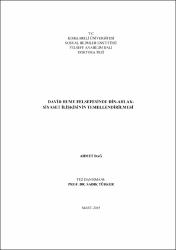| dc.contributor.author | Dağ, Ahmet | |
| dc.date | 2019-04-10 | |
| dc.date.accessioned | 2019-04-11T08:10:34Z | |
| dc.date.available | 2019-04-11T08:10:34Z | |
| dc.date.issued | 2015-06-16 | |
| dc.identifier.citation | Dağ, A. (2015). David Hume Felsefesinde Din - Ahlak - Siyaset İlişkisinin Temellendirilmesi. Doktora Tezi. Kırklareli Üniversitesi Sosyal Bilimler Enstitüsü, Kırklareli. | |
| dc.identifier.uri | https://hdl.handle.net/20.500.11857/778 | |
| dc.description.abstract | Bu tez çalışması Giriş, üç bölüm ve sonuçtan oluşmaktadır. Giriş bölümünde D. Hume'un mevcut uygarlığın oluşmasındaki yeri ve önemine, filozofun din-ahlak-siyaset anlayışı ilişkisine, tezin başlık ve konularına ve çalışılma nedenine değinilmiştir. Tezin ilk bölümü olan "I- HUME FELSEFESİNDE DİN-AHLAK-SİYASET DİZGESİ" bölümünde ahlak ve siyaset kavramlarına, etik türlerine ve filozofun din-ahlak-siyaset bağlamında konumuna yer verilmiştir. Epistemoloji-ahlak-siyaset dizgelerinin Hume felsefesindeki sistematik yönüne değinilmiştir. İki din eleştiricisi olan Hume ve Nietzsche karşılaştırması yapılmıştır. İkinci bölüm olan "II. HUME FELSEFESİNİ BELİRLEYEN ÖĞRETİLER VE AHLAK-SİYASET TEORİSİNİN İKİCİ/DUALİST UNSURLARI" bölümünde "izlenimler-idealar, uzay-zaman, nedensellik-alışkanlık, yapay-doğal değerler, olgu-değer, ahlaki duygudaşlık-kişisel çıkar, adalet-mülkiyet, hükümet-itaat, otorite-özgürlük" ikililerine değinilerek bu kavramlarla Hume'un din-ahlak-siyaset ilişkisi anlaşılmaya ve temellendirmeye çalışılmıştır. "III. HUME'UN DİN-AHLAK-SİYASET İLİŞKİSİYLE İLGİLİ GÖRÜŞLERİNİN ETKİLERİ" bölümünde Hume'un insan doğası algısına, çağına, siyasal iktisat anlayışına ve Tory-Whig ayrımında siyasal konumuna değinilmiştir. A.B.D.'nin inşasına katkısından hareketle ve felsefesinin modern-postmodern unsurlar taşıması nedeniyle din-ahlak-siyaset bakımından günümüz dünyasına etkisine değinilmiştir. Sonuç bölümünde ise antikite, modernite ve postmodernite unsurları taşıyan çağının tanığı ve filozofu olan Hume'un sosyal bilimci bir özelliğe sahip olduğundan bahsedilmiştir. Antroposantrik (insan merkezli) ahlak anlayışı inşa ederek günümüzün dindışı, akılcı, dünyevi, immoral ve kapitalist mekanik bir dünyanın oluşmasına katkısının bulunduğu tespitinde bulunulmuştur. | |
| dc.description.abstract | This thesis is composed of introduction, three chapters and conclusion. In the introduction, Hume`s position and importance in formation of current civilization, philosopher`s religion-ethics-politics relation, thesis name and subjects and reasons of this research are mentioned. The first chapter, named "Religion-Ethics-Politics System in Hume`s Philosophy", includes concepts of ethics and politics, types of ethics and The Philosopher`s position in religion-ethics-politics context. The systematic aspect of the system of epistemol ogy-ethics-politics in Hume`s philosophy is mentioned. The comparison of Hume and Nietzsche, who are two critics of religion, is made. In the second chapter, named "Doctrines designating Hume`s Philosophy and dualist elements of ethical-political theory", by touching upon couples like "feelings-ideas, space-time, causality-custom, artificial-natural values, fact-value, sympathy-personal interest, justice-ownership, government-obedience, authority-freedom", Hume`s religion-ethics-politics relation is tried to understand and justify. In third chapter named "Effects of Hume`s thought about religion-ethics-politics relation" Hume`s conception of human nature, his period, understanding of political economy and political position in Tory-Whig distinction mentioned. Based on contribution to construction of U.S.A. and because his philosophy including modern-post modern elements, with regards to religion-ethics-politics relation his effect to today`s world mentioned. In conclusion, carrying antique, modern and post-modern elements, and as a witness and philosopher of his era, it is told that Hume has a characteristic of social scientist. It is set that grounding ethics Antropo-santrik (human centered) he contributed to formation of current world which is non-religious, rationalist, secular, immoral and capitalist and mechanic. | |
| dc.language.iso | tur | |
| dc.publisher | Kırklareli Üniversitesi Sosyal Bilimler Enstitüsü | |
| dc.rights | info:eu-repo/semantics/openAccess | |
| dc.rights.uri | http://creativecommons.org/licenses/by-nc-nd/3.0/us/ | * |
| dc.subject | İnsan Doğası | |
| dc.subject | Din | |
| dc.subject | Ahlak | |
| dc.subject | İktisat | |
| dc.subject | Religion | |
| dc.subject | Ethics, Politics | |
| dc.subject | Human Nature | |
| dc.subject | Economy | |
| dc.title | David Hume Felsefesinde Din - Ahlak - Siyaset İlişkisinin Temellendirilmesi | |
| dc.title.alternative | Justification of Religion - Ethics - Politics Relationship by David Hume | |
| dc.type | doctoralThesis | |
| dc.department | Fakülteler, Fen-Edebiyat Fakültesi, Felsefe Bölümü | |
| dc.relation.publicationcategory | Tez | |
| dc.institutionauthor | Dağ, Ahmet | |





















